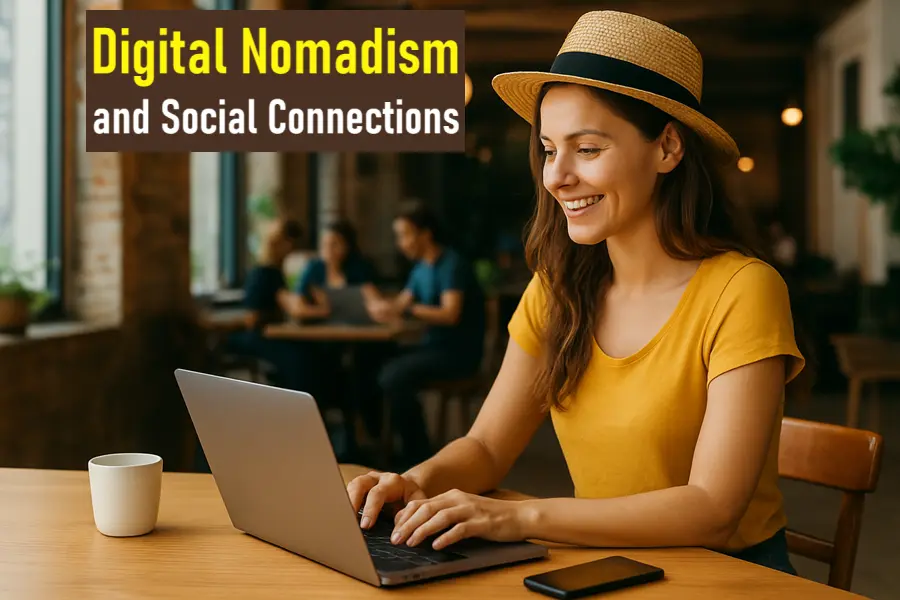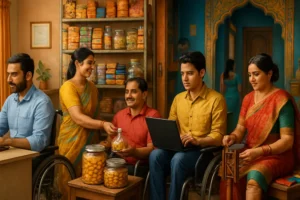Digital Nomadism and Social Connections: Sociological Perspectives
Digital nomadism means you work from anywhere in the world. You might work from a beach, a mountain town, or a cozy café. All you need is a laptop and an internet connection. This lifestyle gives freedom and flexibility.
Digital nomadism has become a popular lifestyle in recent years. It means working remotely while traveling. People who live this way get to explore new places and meet new people. But this lifestyle also affects how they build friendships and stay connected.
In this blog, we will explore how being a digital nomad can change the way we connect with others. We’ll look at the good, the challenging, and how to make meaningful social ties.
Let’s understand the impact of digital nomadism on social connections through sociological lenses. Discover how digital nomadism shapes friendships, challenges social bonds and offers new ways to connect while traveling the world and working remotely.

The Impact of Digital Nomadism on Social Connections
Digital nomadism is more than just a trend—it’s a lifestyle shift that is reshaping how people work, travel, and connect with others.
A digital nomad works remotely while traveling to different places, often moving from country to country or city to city.
On the surface, it sounds like a dream: working from beaches, mountain cafés, or historic city centers while meeting fascinating people from around the globe. And it truly can be magical.
But like any lifestyle, it has both rewards and challenges—especially when it comes to maintaining meaningful social connections.
Friendships, family ties, and even romantic relationships can be affected in unexpected ways.
It can feel exciting and full of discovery. But it’s not always easy. Being always on the move brings social trade-offs. To understand them, let’s look at how our social life changes when we adopt this lifestyle.
Whether you’re already a digital nomad or just curious about the lifestyle, this article will help you understand its true impact on human connection.
What Is Digital Nomadism?
Digital Nomadism is a lifestyle where individuals leverage technology—especially remote work capabilities—to live and work from anywhere in the world.
Instead of being tied to a single location, digital nomads travel frequently, often choosing destinations with affordable living costs, vibrant cultures, or strong internet infrastructure
You could be answering emails from a Bali café in the morning, joining a Zoom meeting from a Lisbon coworking space in the afternoon, and planning a weekend hike in the Swiss Alps by evening. All you really need is a laptop, a reliable internet connection, and the ability to adapt quickly to new environments.
The appeal is obvious—freedom, adventure, and the chance to see the world without putting your career on hold.
For example, you might learn about local customs in Thailand, traditional cooking methods in Italy, or innovative business ideas from fellow nomads in Mexico.
Many nomads choose this life for the excitement of exploring different cultures, climates, and cuisines. Others are drawn to the flexibility of creating their own schedule and avoiding the routine of a 9-to-5 office job. But behind the Instagram-perfect moments is a reality that’s less often discussed: the social dynamics of constant movement.
Being in a new place every few weeks or months changes how you make friends, maintain relationships, and feel a sense of community. That’s where the real complexity of this lifestyle begins to show.
Social Life Before and After Embracing the Nomad Lifestyle
Before becoming a digital nomad, most people have a stable social network. Friends live nearby, coworkers are a daily presence, and family gatherings are part of the yearly routine.
Your community is built over time—through shared experiences, routines, and repeated interactions. You have “your spots” where everyone knows you, and it’s easy to feel like you belong.
After becoming a nomad, things change dramatically. Suddenly, you’re in a new country where nobody knows your name. While this can feel exciting at first, it also means you must start from scratch socially.
You might meet lots of interesting people quickly, but relationships can be fleeting. You share great conversations with someone in a hostel or coworking space—only to part ways a week later when your travel plans diverge. The lack of long-term familiarity can make you feel disconnected.
On the other hand, it pushes you to be more outgoing, adaptable, and curious. You learn to connect faster, but you also learn to say goodbye often. Over time, this constant cycle shapes how you view friendship and community.
Digital nomads pursue freedom but often rely on strict self-discipline and external structures to separate work from leisure in tourism-driven environments.
Let’s summarize social life before and after adopting the nomadic lifestyle.
Before Digital Nomadism
- Many people have friends, family, and coworkers near them.
- Social connections tend to be more stable and predictable.
- You can have regular face-to-face interactions.
- Support systems are easier: you see people often and build routines.
After Becoming a Digital Nomad
- You meet people in different places.
- You might make friends quickly—but then move on soon after.
- It’s harder to keep long-term connections.
- You lose daily routines with old friends and family.
- Your sense of “home” may feel more fluid.
Benefits of Nomadic Living on Social Connections
Living a nomadic lifestyle—whether as a digital nomad, slow traveler, or seasonal explorer—can profoundly impact social connections. Virtual nomad communities—like Digital Nomad Girls and Slack groups— help foster real-world meetups and friendships.
MDPI research applies Maslow’s hierarchy to digital nomads, noting how social connection and esteem become central once basic needs are met.
Look at the key benefits of nomadic living on social connections:
Meeting People from Many Cultures: Traveling exposes you to people from different backgrounds. You learn about their traditions, foods, and ways of life, which makes your social network more diverse and your understanding of the world richer.
Building Confidence in Social Skills: Constantly meeting new people improves your ability to start conversations and connect quickly. You become more comfortable in unfamiliar situations, making it easier to make friends anywhere you go.
Expanding Your Global Network: You form friendships in many countries. These connections can offer future travel tips, job opportunities, and a place to stay. A global network opens doors to experiences you might never have imagined.
Learning New Perspectives: Conversations with people from various walks of life expand your thinking. You discover fresh ideas, challenge old beliefs, and gain insights that can change how you see yourself and the world.
Creating Memorable Shared Experiences: Shared adventures—like hiking a volcano or joining a local festival—build strong bonds quickly. These unique moments create memories that you and your friends will cherish, even if you part ways later.
Becoming More Adaptable: Meeting different personalities and adapting to various social customs strengthens your flexibility. This skill helps you connect with almost anyone, no matter their culture, age, or background.
Finding Like-Minded Communities: Coworking spaces, coliving homes, and nomad meetups gather people with similar lifestyles. These communities make it easier to form friendships based on shared goals and experiences.
Practicing Multiple Languages: Living in different countries often means speaking or learning new languages. Even basic phrases can break barriers and help you connect warmly with locals, making social interactions more rewarding.
Enjoying Spontaneous Connections: Nomadic life encourages unexpected friendships. A chance meeting in a café or on a train can lead to lifelong bonds. Being open to these moments makes social life exciting and unpredictable.
Strengthening Virtual Relationships: You rely more on online tools to keep in touch. This often makes your virtual friendships more intentional, with deeper conversations and regular updates to stay connected across time zones.
Challenges to Social Connections for Digital Nomads
As exciting as it is to meet new people constantly, it can also be exhausting.
Many nomads describe their relationships as “surface level” because there’s rarely enough time to build deep bonds before someone moves on. The pace of travel makes it difficult to nurture long-term friendships.
Loneliness is another common challenge. Even in beautiful, lively destinations, you might feel isolated without your usual circle of friends or family.
Different time zones add to the struggle—coordinating a call with loved ones can feel like solving a puzzle. Some nomads also experience a sense of “rootlessness.” Without a consistent home base, it’s easy to question where you truly belong.
Rebuilding your social life in every new location requires constant effort, which can lead to emotional fatigue. The Travel Psychologist underscores emotional fatigue from repeatedly forming temporary relationships, and the toll on identity and well-being.
While technology helps bridge some gaps, it’s not a perfect substitute for in-person connection. Over time, the cycle of making friends and saying goodbye can leave you craving stability, even if you still love the freedom of travel.
Recognizing these challenges is the first step to overcoming them.
Strategies to Build and Sustain Meaningful Relationships
Digital nomadism brings excitement, freedom, and a chance to connect with people worldwide.
If you want to keep strong social connections as a digital nomad, you have to be intentional.
Here’s a set of strategies for building and sustaining meaningful social connections as a digital nomad.
Stay in One Place Longer: Spend several weeks or months in one city. This gives you time to know people better. Longer stays help relationships grow deeper, rather than ending quickly after a short visit.
Join Coworking Spaces: Coworking spaces gather professionals from all over the world. They’re great for meeting like-minded people. Working side-by-side builds natural conversation and lasting connections through shared projects and daily interactions.
Attend Local Events: Join local meetups, festivals, or workshops. Shared activities make it easier to start conversations. You’ll meet both locals and fellow travelers, creating friendships rooted in common interests and experiences.
Keep in Touch with Old Friends: Schedule regular calls or messages with friends from home. This keeps relationships alive and shows you still value them. Distance doesn’t have to mean drifting apart if you make the effort.
Volunteer in the Community: Volunteering lets you give back while meeting caring, community-minded people. Shared service experiences can build stronger emotional bonds and give you a sense of belonging in a new place.
Join Hobby or Interest Groups: Whether it’s hiking, photography, or language exchange, interest groups connect you with people who share your passions. This creates instant topics to talk about and strengthens bonds through regular activities.
Use Social Media Purposefully: Share updates, respond to others, and engage in meaningful conversations online. Social media can maintain and deepen relationships if used intentionally, instead of just scrolling passively through feeds.
Organize Small Gatherings: Host dinners, game nights, or coffee meetups. Inviting people to share time together makes connections warmer and more personal. These gatherings can turn acquaintances into close friends over time.
Be Consistent in Communication: Even short check-ins matter. A simple message or shared photo can remind someone you’re thinking of them. Consistency builds trust and keeps relationships strong despite physical distance.
Be Open and Authentic: Share your true thoughts, feelings, and experiences. Being real encourages others to do the same. Authenticity creates trust and helps form deep, meaningful connections, even if you don’t meet often.
Real Stories from Digital Nomads
Anna, a web developer from Germany, says, “At first, I felt free and energized. Every week was a new adventure. But after six months, I missed having a consistent group of friends. I started staying longer in each city to build deeper connections.”
Ravi, an Indian graphic designer, shares, “Coworking spaces were my lifeline. They gave me a ready-made community. We shared meals, swapped travel tips, and sometimes even worked on projects together. The bonds weren’t always permanent, but they felt real while they lasted.”
Another nomad, Carla from Brazil, recalls forming an online book club with friends she met in Portugal. “Even though we live on different continents now, we meet on Zoom every month. It keeps our friendship alive.”
These stories highlight a common truth: nomadic living offers rich social experiences, but you have to work at making them last.
Many nomads eventually find a rhythm that balances travel with intentional connection—proving that meaningful relationships are possible, even when your address keeps changing.
The Role of Technology in Keeping Us Connected
Technology is the lifeline of the digital nomad community. Messaging apps like WhatsApp or Telegram make it easy to share updates instantly, no matter the distance.
Video calls through Zoom, Google Meet, or FaceTime help keep conversations personal and engaging.
Social media platforms like Instagram and Facebook allow you to stay in the loop with friends’ lives and share your own adventures.
Online communities and forums—like those on Reddit or dedicated nomad Facebook groups—offer advice, support, and sometimes even job opportunities.
Scheduling tools like Google Calendar help coordinate calls across tricky time zones.
Technology also enables creative ways to stay connected: virtual game nights, shared playlists, or collaborative projects keep bonds alive. However, it’s important to remember that tech can’t fully replace in-person interaction.
Digital communication keeps relationships afloat, but it lacks the warmth of shared physical experiences.
For nomads, the best approach is to use technology as a bridge—something that maintains connection until you can meet again face-to-face.
Read Here: The Role of Technology in Transforming the Workplace
Long-Term Effects on Social Well-Being
Living as a digital nomad shapes your social life in unique ways. Some people thrive on the constant variety, finding the lifestyle enriching and full of opportunities for personal growth. They become experts at connecting quickly and maintaining friendships across borders. Others, however, may struggle with the lack of deep, long-term bonds.
Over years, this can lead to feelings of loneliness or emotional detachment. Some nomads eventually slow their pace, choosing to stay longer in one place or even establishing a home base to create more stable social roots.
On the positive side, the friendships you do keep tend to be highly intentional—you’ve worked to maintain them despite distance. You also build a global network, meaning you could have friends waiting to meet you in multiple countries.
Ultimately, the effect on your well-being depends on your personality, needs, and how actively you manage your social connections.
With balance and planning, the nomadic lifestyle can support both freedom and meaningful relationships.
Read Here: Top 10 Work-From-Home Jobs for Students That Pay Well
Final Thoughts
Digital nomadism offers an exciting blend of travel, work, and cultural exchange. It opens doors to friendships across the globe and teaches you how to adapt socially in any environment.
But it also comes with challenges: fleeting connections, loneliness, and the struggle to maintain deep bonds.
The key to thriving socially as a nomad lies in being intentional—choosing environments that foster connection, keeping up with loved ones, and knowing when to slow down to build roots.
Technology can help bridge the gap, but in-person experiences remain irreplaceable.
If you’re considering this lifestyle, prepare for both its highs and lows.
Embrace the chance to meet new people, but also protect the relationships that matter most. In the end, the digital nomad journey isn’t just about where you go—it’s about who you meet and how you stay connected along the way.
Author: Mahtab Alam Quddusi – A Passionate Writer, Blogger, Social Activist, Postgraduate in Sociology and Social sciences and Editor of ScientificWorldInfo.Com.





